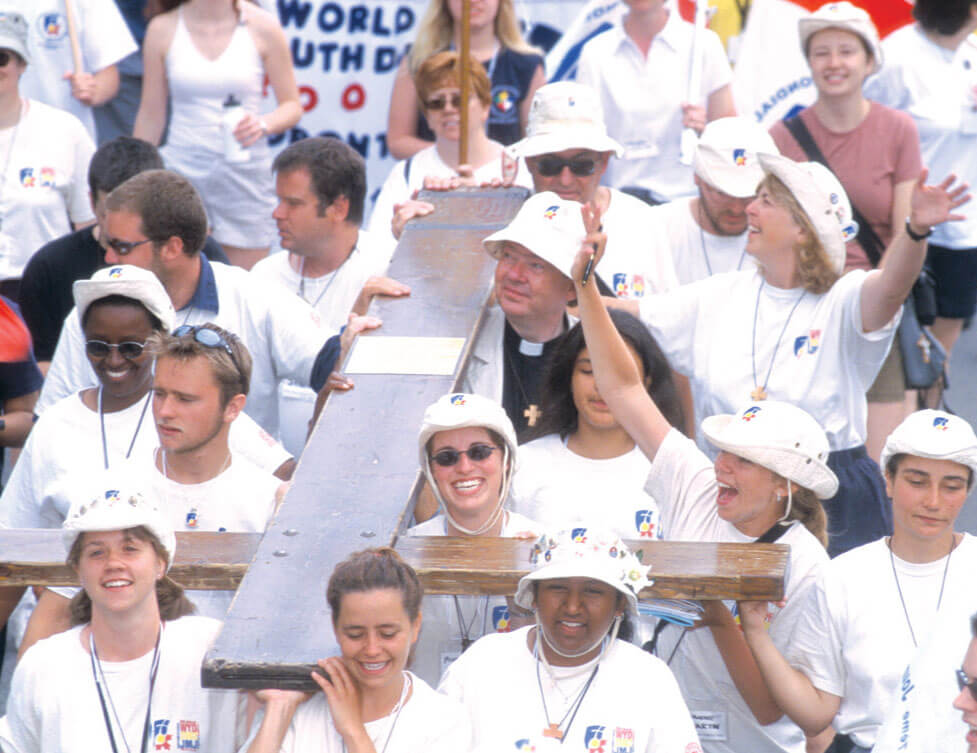
The journey Jesus is about to take is ultimately a journey from death to life that lifts Jesus to glory and promises his followers a path to life with God that lies farther on and deeper in than death. Luke catches us up in God’s sweeping divine purpose and places Jesus’ actions in their context within the whole history of Israel, the Church, the world.
A few verses before Jesus begins his journey to Jerusalem, his disciples see him talking with the prophets Moses and Elijah about the exodus he is about to accomplish in Jerusalem (9.28-36). Luke uses the word exodus to liken Jesus’ upcoming journey to Israel’s exodus from slavery in Egypt.
The journey theme unifies the next ten chapters of Luke’s gospel. Events on this journey repeat a pattern of fulfillment and rejection that Luke sees in Israel’s history and wants us to see in Jesus’ life.
Jesus’ first sermon in Nazareth introduces the pattern when Jesus reads from the prophet Isaiah and claims he is the one the Spirit has anointed to bring good news to the poor and inaugurate a year of God’s favor. His hometown folks reject his claim.
Similarly, in Sunday’s gospel, the people in the first town Jesus visits on his way reject him. These Samaritans reject Jesus because he is going to Jerusalem. They refuse to worship God in Jerusalem and refuse to associate with people who do.
- If Jesus came through your town this week, what do you think would be his message and how would your faith community welcome and accept him?
Jesus’ disciples serve an apprenticeship on this journey. They cannot expect that following Jesus will cost them less than Jesus’ faithfulness to God costs him. The divine power Jesus reveals is for healing, forgiving, and setting people free.
Jesus promises his disciples no place to lay their heads. The Samaritans refuse to take Jesus’ company in for a stay. The company is on the road without homes and with none of the possessions that homes allow.
In Sunday’s gospel two people ask to join Jesus’ company as they walk along, and Jesus invites a third to follow him. The exchanges between Jesus and these three instruct us in the cost of discipleship.
The person Jesus invites to follow him wants first to bury his father. Jesus asks for a commitment that supersedes family obligations and goodbyes. A new community of faith is forming on this journey with ties stronger than blood.
Today following Jesus does not require leaving possessions, family, and friends. Christianity is an acceptable and established world religion. The Catholic Church requires baptism, weekly Eucharist, and yearly confession of serious sin of its members. Besides its required practices, it has organizations on the ground worldwide that work for justice and serve people in poverty.
Yet the Church as institution puts off many young people, who feel spiritual but uninterested in religion. Many would love to meet Jesus in person, follow him, and simply give themselves in service — unencumbered by dogma and traditions, untainted by scandal.
Sunday’s gospel insists that faith in Jesus is a relationship so basic it supersedes and underlies all others. It calls us to do better at evangelizing than James and John, who want to rain fire on those inhospitable to Jesus’ message. Sunday’s gospel calls us to embody the message in who we are and all we do.
- How are being spiritual and being religious different? How does one affect the other?
- Imagine yourself on this journey with Jesus and his disciples. What do you talk about at the end of the day?
Jesus and the men and women disciples who accompany him don’t know what will unfold in Jerusalem. But the gospel writer knows that Jesus was put to death and God raised him up. We today know that Jesus claims the faith of Christians worldwide. The journey that costs Jesus everything has become a pattern for the spiritual life of Christians.
For some, the cost of faith and mission is martyrdom: Peter and Paul in the AD 60s in Rome; Perpetua and Felicity, Carthage, AD 203; the Jesuits of the University of San Salvador, their housekeeper, and her daughter, 1989; Sister Dorothy Stang, SND, 2005 in Brazil. The Christian journey can cost everything in many ways — lifelong parenting, paying workers rather than oneself when a company has slack times, treating cancer patients, walking with others through their losses.
In the Middle Ages Christians made pilgrimages to holy places to pray. People today still walk the Camino de Santiago, carrying a small treasure of their past lives in their backpacks and hoping to find new meaning. Hugeberc of Hildesheim writes about pilgrimage as “walking my spirit.” “Feet first,” she says, “and your spirit will follow.”
The people that Jesus meets with parents to bury and friends to bid farewell introduce us to our yes-but-not-yet selves. Perhaps they do follow Jesus in time. The narrative leaves us wondering how these anonymous people will use their freedom and how we will use ours.
- What is something spiritual you plan to do but not yet?
